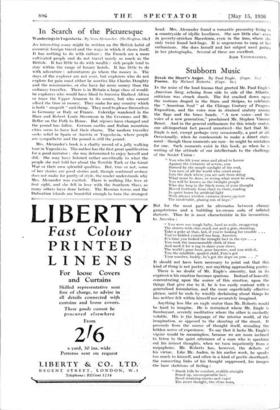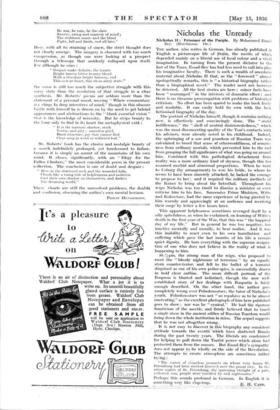Stubborn Music
Break the Heart's Anger. By Paul Engle. (Cape. :is.) Poems. By Michael Roberts. (Cape: 5s.) Ix the noise of the loud buzzes that greeted Mr. Paul Engle's American Sang, echoing from side to side of the Atlantic,
criticism was struck dumb. The fist crashed down upon the rostrum draped in the Stars and Stripes, to celebrate the " American Soul " at the Chicago Century of Progress Exposition, and the voice rose in strained oratory among the flags and the brass bands. " A new voice—and the
voice of a new generation," proclaimed Mr. Stephen Vincent Benet. And in the general enthusiasm for this windy orator, one all-important fact passed unnoticed—the fact that Mr. Engle is not, except perhaps very occasionally, a poet at all.
Occasionally, when he condescends to make a direct state- ment—though those moments are rare—he might be mistaken for one. Such moments exist in this book, as when he is writing of the attitude of our intellectuals to the challenge of the Soviet Union :
" You who lift your arms and plead in horror
Against the certainty of action, you Burned by the simple sunlight of the real, You men of all the world who crawl away Into the dark where you are safe from doing What must be done, or seeing what must be seen, You will be known as the twilight people Who day long in the black room of your thought Moved restlessly from chair to chair, reading In quiet hours by artificial light With always window curtains drawn against The intolerable, glazing sun of hope."
But for the most port he alternates between clumsy gangsterisms and a bubbling ice-cream soda of inflated
rhetoric. Thus he is most characteristic in his invocations to America : " You were one tough baby, hard as nails, swaggering The streets with chin stuck out and a grin, shouting, Take a poke at that, hid, if you're looking for trouble . Y.-oleve kidded yourself too long, America,
It's time you looked the straight fact in the eye . . . You took the immeasurable cloth of time And used it for a rag to shine your shoes.
The world's gone bust, gone haywire, and you with it, You the infallible, spoiled child, Fate's got Your number, buddy, he's got the dope on you. . . ." . • - • • -
It should not have been necessary to point out that this kind of thing is not poetry, nor anything approaching poetry.
There is no doubt of Mr: Engle's sincerity, but in its expressicn his emotion becomes spurious. Instead of honestly concentrating upon the source of • this emotion, upon the things that give rise to it, he is too easily content with a generalised formulation, and the more superficially effective phrase, until he endsby windily declaiming about things he has neither felt within himself nor accurately imagined. Anything less like an eagle orator than Mr. Roberts would be hard to imagine. He is restrained where Mr. Engle is flamboyant, severely meditative where the other is excitedly voluble. His is the language of the interior world, of the imagination, as opposed to the shouting of the street. It proceeds from the source of thought itself, revealing the hidden nerve of experience. To say that it lacks Mr. Engle's
vigour would be meaningless, because we are more inclined to listen to the quiet , utterance of a man who is speaking out his inmost thoughts, when we turn impatiently from a megaphOrie. bir. Roberts has, however, the defects of his virtue.-. Like.Mr. : Auden, in his earlier work, he speaks too much to himself, and often in a kind of poetic shorthand,
the connecting links of his thought suppressed, his images the- bare skeletons of feeling :
" Harsh hills be comfort, stubble-straight Stand up, unconquerable fact; Rend straining sinews and exact The strict thought, the clean hate.
Be war, be ruin, be the elate Swerve, swing and mastery of mind ; The stubborn music and tbe blind Fight, fall and finish, end-all fate." - I lere, with all its straining of sinew, the strict thought does not clearly emerge. The imagery is obscured with too much compression, as though one were looking at a prospect through a telescope that suddenly collapsed upon itself.
For although he cries : " Despair make definite, the innate Bright barren bitter beauty blond With a frivolous bright bravery, end This sick-at-heart, this oh-so-sorry state." . .
the verse is still too much the subjective struggle with this
sorry state than the resolution of are struggle in . a , clear synthesis. Mr. Roberts' ponnS are seldom more than the statement of a personal mood, moving " Where commentary ivy clings In deep interstices of mind," though in this obscure battle with himself he is driven on by the need to get behind
appearances and abstractions to the " blank essential vision," that is the knowledge of necessity. But he strips beauty to
the hone only.to'find in its heart the metaphysical void :
. " It is the intrinsic shadow, stark Terror, and pity : nameless grief, Hard structure, joy that cannot find Clear song in word or withered leaf."
Mr. Roberts' hook has the elusive and nostalgic beauty of a search indefinitely prolonged, yet foredoomed to failure, because it is simply an ascent of the mountains of his own mind. It closes, significantly, with an " Elegy for the Fallen (limbers," the most considerable poem in the present collection. The conclusion is one of doubt and despair : " Here in the shattered rock and the wounded hills, .
Clouds like a rising tide of helplessness and isolation Cast. their own shadow on themselves, and darken The dreaming world."
These clouds are still the unresolved problems, the doubts and confusion, obscuring the author's own mental horizon.
PHILIP HENDERSON.























































 Previous page
Previous page